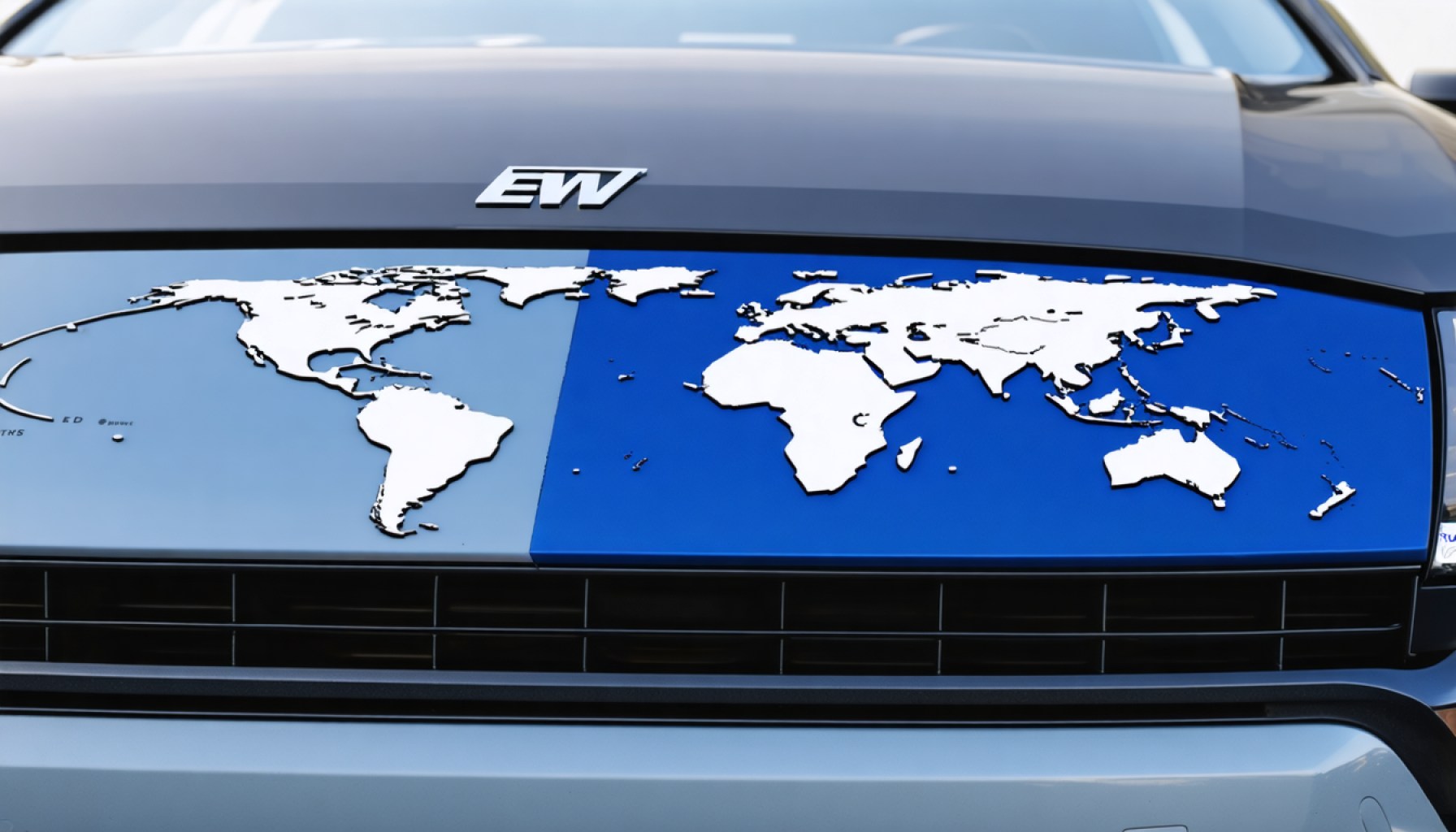
- The EV revolution is reshaping global power dynamics, especially between the U.S. and China, over crucial rare earth minerals used in EV batteries.
- China’s mineral export restrictions push U.S. companies to innovate and seek alternate supply chains.
- Lime and Redwood Materials’ partnership exemplifies a forward-thinking approach, focusing on battery lifecycle innovation and recycling to reduce global market reliance.
- Recycling of used batteries has become a sustainable resource, with Redwood Materials recycling 20 gigawatt-hours of minerals in 2024 alone.
- The collaboration represents a cultural industry shift towards sustainable mobility and a circular economy, addressing environmental and economic challenges.
- This strategic alliance offers a blueprint for the EV industry to remain resilient amid global trade tensions.
The electric vehicle (EV) revolution is not just a technological leap; it’s becoming a geopolitical chess match. As global dynamics shift, the United States finds itself caught in a delicate balance with China, especially concerning rare earth minerals crucial for EV batteries. With China tightening the noose on its mineral exports, companies on American soil are prompted to innovate and steer away from traditional supply chains.
Among the flurry of strategic maneuvers, the alliance between Lime and Redwood Materials stands out—not just as a business partnership, but as a pioneering effort in securing a cleaner, self-sustaining future. Lime, a leading company in shared mobility, now finds an ally in Redwood Materials, a recycling powerhouse, founded by Tesla’s own JB Straubel. Their mission: reimagine the lifecycle of electric batteries and reduce reliance on volatile global markets.
Batteries: From Burden to Boon
Once considered a financial and environmental burden, used batteries are now treasure troves of untapped potential. Consider this—the average battery contains the building blocks of its successor. By extracting valuable materials and reintroducing them into the production cycle, Redwood Materials has effectively flipped the script on battery waste, transforming it into a sustainable resource. A jaw-dropping 20 gigawatt-hours of these minerals were successfully recycled in 2024 alone, enough to usher thousands of new electric vehicles onto roads worldwide.
America’s Shift in Gear
This shift is more than just economics; it’s a response to a larger narrative. With the global tit-for-tat on tariffs and trade restrictions, the U.S. faces a stark reality: adapt or fall behind. This is where the Lime and Redwood collaboration illustrates an ingenious pivot. By betting on recycling, they address not only a business need but a national one, aiming to build an EV ecosystem that stands resilient against international constraints.
Yet, this partnership is about more than just numbers. It signals a cultural shift within the industry. As Lime collects outdated e-scooters and Lime Bikes from urban centers around the world, these devices become an integral part of Redwood’s recycling stream, thereby closing the loop on sustainable mobility.
The Need for a Circular Economy
The emergence of such initiatives underscores a transformative moment for the EV industry—one that promises not only environmental benefits but secures economically viable pathways too. As businesses and entire industries move towards a circular economy model, the need for partnerships like Lime’s and Redwood’s will only grow.
The escalating trade tensions between two global giants act as a clarion call for innovation and ingenuity. The path Lime and Redwood have charted is not just a reaction but a blueprint—a strategic road map pointing towards an autonomous, environmentally-friendly future. The larger question is posed to the rest of the industry: Who will rise to the challenge, chart new partnerships, and redefine their role in an ever-competitive EV market?
This is more than just a battle over battery supplies—it’s a pioneering movement towards redefining how industries interact with our planet and each other.
Are We On the Brink of an Electric Vehicle Renaissance?
Understanding the Impact of the EV Revolution on Global Dynamics
The electric vehicle (EV) revolution is not just a technological leap forward; it’s reshaping geopolitical landscapes, especially with critical dependencies on components like rare earth minerals. With countries such as China holding substantial control over these resources, nations like the United States are driven to innovate and break free from traditional supply chains. A notable example of this shift is the partnership between Lime and Redwood Materials, spearheading a new era of recycling and sustainability.
Real-World Use Cases for the Lime and Redwood Partnership
1. Sustainable Transportation Solutions: Lime utilizes Redwood Materials’ recycling technology to refurbish and reuse materials from outdated or damaged e-scooters and bikes, aiding urban mobility without the environmental cost of mining new materials.
2. Closed-Loop Manufacturing: By extracting valuable components from retired batteries, Redwood Materials supports closed-loop production systems, which significantly reduce the need for new raw materials.
3. Potential for Widespread Application: This model showcases what’s possible across various industries requiring battery components, offering a blueprint for companies looking to establish environmentally-conscious operations.
Insights and Predictions: The Future of EV Manufacturing
– Increased Local Production: With the emphasis on recycling and sustainable practices, expect a surge in local production facilities that minimize dependencies on foreign imports.
– Advancement in Recycling Technologies: Ongoing development in recycling technologies will enhance the efficiency and effectiveness of material recovery processes, lowering production costs and boosting environmental benefits.
– Wider Adoption of Circular Economy Practices: As highlighted by the Lime and Redwood partnership, businesses around the globe will increasingly adopt circular economy principles to ensure long-term viability and compliance with environmental regulations.
Pros and Cons of the Current EV Industry Model
Pros:
– Environmental Impact: Recycling and localizing supply chains reduce carbon footprints and waste, supporting global sustainability goals.
– Economic Resilience: Minimizing reliance on unstable foreign supply chains insulates economies from geopolitical tensions and market volatility.
– Innovation Stimulus: The challenges posed by material dependencies drive technological advancements and innovation.
Cons:
– Initial Investment Costs: Establishing recycling facilities and redesigning supply chains require substantial initial investments.
– Technological Limitations: Current recycling technologies may not yet match the efficiency of traditional mineral extraction, potentially slowing advancement.
Market Forecast and Industry Trends
Global EV sales are projected to rise dramatically as countries implement stricter emissions regulations and invest in green technologies. Analysts predict that by 2030, electric vehicles could account for 50% or more of all vehicles sold globally, underscoring the importance of infrastructure development and innovation in battery technology.
Actionable Recommendations
1. Adopt Recycling Initiatives: Manufacturers should prioritize incorporating advanced recycling programs as integral parts of their production processes.
2. Explore Strategic Partnerships: Like Lime and Redwood, forming alliances with recycling specialists can significantly enhance sustainable supply chain practices.
3. Stay Informed on Industry Trends: Keep abreast with ongoing advancements in both policy and technology to leverage opportunities for growth and compliance.
Conclusion
As the battle for sustainable resources intensifies, the EV industry must pivot toward innovations in recycling and self-sufficiency to thrive. The strategic roadmap laid by Lime and Redwood Materials offers inspiration for companies aiming to redefine their roles in the electrified future. For more insights on sustainable business practices, visit [Lime](https://www.li.me) and [Redwood Materials](https://www.redwoodmaterials.com).



